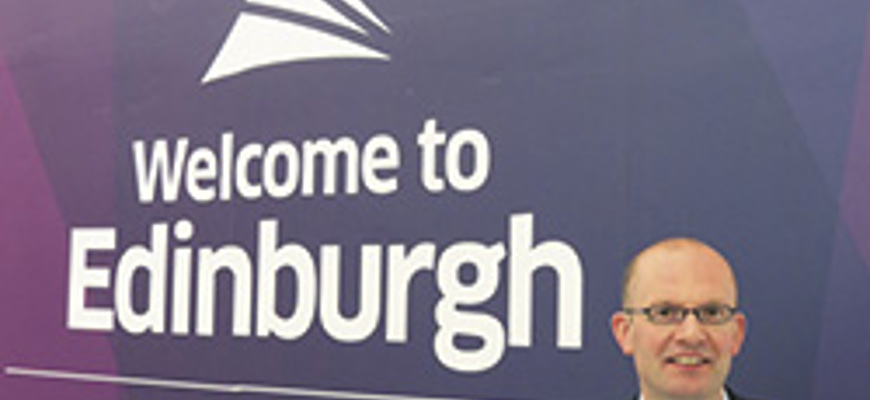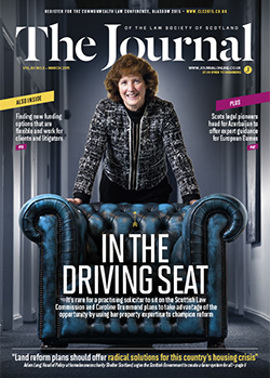A career taking off

What was the career path to your current position?
I studied at the Universities of Dundee and Utrecht and trained at Semple Fraser in Glasgow. I had planned a career in commercial property, but enjoyed my first seat working with David Semple so much that I switched to corporate law.
After qualifying, I worked in Semple Fraser’s Edinburgh office for a year before moving to Dickson Minto in Glasgow and in 2004 the corporate team at Masons (now Pinsent Masons). I had a couple of secondments into ScottishPower, which cemented my growing belief that I would like to move in-house. I joined Raytheon UK in Glenrothes in 2007 as in-house counsel. Raytheon is a large US defence contractor. I became dual qualified in 2008. After seven years in Raytheon the opportunity at Edinburgh Airport came up and it was too good to miss. I joined as legal counsel last July and at the end of 2014 was promoted to legal director.
How is your legal in-house function structured and how much input do you have in business strategy and governance?
Legal at the airport now sits at executive level, reporting to the CEO, and has true cross-functional oversight. The airport recognises the value in having its legal counsel “at the table”. As a member of the executive team and company secretary, I get closely involved in business strategy and governance, board meetings and walking the job.
What is a typical working day for you?
A typical day might encompass an executive team meeting to discuss airport strategy, or new projects and initiatives; advising various heads of departments on contracts ranging from procurement of services to the provision of massage chairs or multi-million pound property developments; working with external counsel to manage our litigation portfolio; and perhaps delivering some targeted training or advice to colleagues.
What motivates you on a Monday morning?
Seeing planes taking off and landing at the airport when I’m out early with my Golden Labrador on the local Fife beach – I find it really motivating to be part of the team making that happen. You can see the results of everyone’s hard work all around; it is very “tangible”.
What was the biggest change for you when you moved in-house? What do you really enjoy about working in-house?
I remember being surprised at just how different the in-house role is to the “consultancy” model as between a firm and its clients. I think it is very important to have a mentor to guide you through this transition when you first go in-house, and I was lucky in this regard in that the legal director at Raytheon did just that.
The best part of working in-house for me is the variety of tasks and colleagues, and being a real part of all the matters you advise on. The team here at the airport are very dedicated and their enthusiasm tends to be infectious. I am able to network with many in-house and private practice lawyers as they pass through the airport, which I find very useful. I really enjoy working for such a flagship Scottish organisation.
Has your organisation experienced any major change recently?
It would be fair to say that Edinburgh airport is continually changing and I joined at a good time in its development.
Global Infrastructure Partners (GIP), the owners of Edinburgh, Gatwick and London City airports, committed in 2013 to investing £150 million over five years in Edinburgh, and the changes driven by this investment are evident in the number of projects being completed and commenced here.
Our new East Expansion and security hall both opened in the last few months. There is an ongoing transformation of the retail experience at the airport; and forthcoming projects like new airside passenger facilities and the creation of a fantastic new plaza at the entrance to the airport demonstrate its objectives of growing by choice and providing the best passenger experience.
We hit a significant milestone in 2014 with passenger numbers exceeding 10 million for the first time in the airport’s history, and with the continued investment planned by GIP we will keep growing the business and welcoming more people to Scotland.
What is the most unusual work request you have received?
Recently it would be providing a comprehensive set of measurements so I can be fitted up for full firefighter’s equipment. I will be taking part in a training exercise with the Airport Fire Service which will include an exercise carried out in a smoke-filled training simulator. Can’t wait!
What makes a good in-house lawyer? What’s your career advice for young lawyers who want to consider an in-house career?
I believe it is a mix of pragmatism, flexibility, dedication and organisational fit. Generally speaking, an in-house lawyer will need to understand and assist across a broad range of matters, and tailor his or her advice for a broad range of colleagues and situations.
In my experience, I think it can be an advantage to have a grounding in private practice prior to making a move in-house. Other than that, my advice is to make the decision and go for it. And put all your preconceptions of what it might be like aside – your experience in-house will be driven a great deal by the company you work for and its ethos and culture.
What do you look for when you seek external legal advice from solicitors or counsel? How do you see the in-house/external legal relationship changing?
Quite simply, expertise, engagement, efficiency and value. I have been able to take advantage of some so-called “alternative business structures” when buying legal services for the airport recently, and while I believe there will always be a place for the traditional firm model, I don’t think it will always be the primary way of buying legal services.
I found the facilitated discussion forum on collaboration between the Scottish bar and in-house lawyers at the joint Faculty and ILG 21st Century Bar event in December 2014 very interesting and useful. I have in the past used the English bar and plan to instruct the Scottish bar.
What are the current hot legal topics in your sector and how does the future look for in-house lawyers in your industry?
I believe the UK airport sector has come a very long way since deregulation under the Airports Act 1986 and is a well-functioning, thriving and competitive marketplace. Like many industries, compliance with competition regulation remains an important topic.
From the Scottish perspective, the Smith Commission’s recommendation to devolve air passenger duty to the Scottish Government is very welcome and is undoubtedly a hot topic. We believe this can only have a positive impact on the Scottish economy and are pushing for implementation as soon as possible.
More generally, it is important to keep an eye out for unintended effects of EU, UK and Scottish legislation to the UK airport sector.
Overall, I think this will remain a vibrant and growing sector with plenty to keep its in-house lawyers busy.
Does Scottish legal education and training provide the necessary skills for working in-house in your organisation?
It absolutely provides the grounding necessary. On top of that, get some experience in private practice, then transition into an in-house role.
In my last job I was mostly dealing with English law and I have had to remind myself of some of the quirks of Scots law in comparison – I’m certainly looking forward to being able to sign in counterpart...
I regularly attend ILG CPD events in person and online.
How do you think in-house lawyers today are perceived amongst the wider legal profession?
I think there has been a big increase in the number of in-house counsel in the UK in the last 10 years and that they are more “visible” than they used to be. As a consequence, my experience is that the legal profession and organisations themselves have a better understanding of the variety, importance and value of the role.
What keeps you busy outside the office?
A relentlessly inquisitive three-year-old and a one-year-old who is going the same way. I like to get out on my bike when I can, or go on family walks with the dog. Otherwise, escaping to a good pub with my partner for a long lunch.
What one thing would you take with you to a desert island and why? What would you put in Room 101 and why?
Assuming the island had Wi-Fi, my tablet – everything you need in one device!
Calls from claims farmers, which can be depressing; the Newbridge roundabout on weekday mornings, although I contribute to the problem traffic; and litter, which makes such a mess!
In this issue
- Structured settlements: worth a look?
- Unfairness defined
- Our digital afterlife
- Powers of attorney: full instructions?
- Writings redefined
- Reading for pleasure
- Opinion: Adam Lang
- Book reviews
- Profile
- President's column
- Roll up to register
- People on the move
- Tax plan's on track
- Lease of life
- No win, no fee: no problem?
- Ready to go to court?
- Taking on the expert
- Pensions: keep up with the shake-up
- Equity investment and law firm funding
- Entitled to rely
- See-through setups
- Copyright: defining the boundaries
- Tenancies: the shape of things to come?
- A career taking off
- The system is sound, but...
- Law reform roundup
- Obituary: Leslie Cumming
- From the Brussels office
- From the Clyde to the Caspian
- Some common misconceptions
- Ask Ash
- Mediation: new options
- ABS: time to accept the evidence
- It is OK to change your mind
- Sizing up the class of 2018






